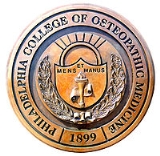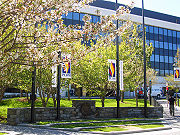
| e id="toc"> |
Philadelphia College of Osteopathic Medicine
Philadelphia
, Pennsylvania
; Atlanta
, Georgia
January 24, 1899
Urban
Private coeducational
Medical & Graduate
Total Approx. 1800
Matthew Schure, PhD
Burgundy and Gray
"Mens et Manus" (The Mind and the Hand)
www.pcom.edu
The Philadelphia College of Osteopathic Medicine (PCOM) is one of the oldest and largest osteopathic medical schools. Founded in 1899, PCOM is home to over 1000 medical students as well as graduate-level students in several other fields of health care
. One of the largest medical schools in the United States
, PCOM is the largest civilian producer of US military physicians. The college stresses the importance of primary care, and produces many primary care
physicians. In 2005, PCOM opened a branch campus in Suwanee, Georgia
.
History

In 1993, PCOM started the graduate program in biomedical science, offering graduate certificates and Master of Science degrees. The Doctor of Psychology was started in 1995. During the 1990s a series of new graduate level programs were added, expanding the scope of the medical school to a wide range of health-care related programs. In 2005 the school expanded to Georgia with a new branch campus, which graduated its first D.O. class in 2009.
Campuses
Encompassing two campuses-one in Philadelphia and one outside Atlanta-PCOM is equally proud of its rich heritage and focus on the future. Convenient to Center City and the suburbs, the beautifully landscaped Philadelphia campus features ample parking and easy access to all buildings and facilities. The atmosphere is friendly and welcoming, inspiring frequent interaction between students and faculty.
In 2005, Georgia Campus- PCOM enrolled its first class in response to the acute need for more health care providers to serve the growing population in Georgia and the surrounding states. The Georgia Campus offers the doctor of osteopathic medicine degree, doctor of pharmacy degree and graduate programs in biomedical sciences.
Academic Offerings
As a free-standing medical school, PCOM offers only graduate-level training. Degrees offered by the college include:
Philadelphia Campus:
Doctor of Osteopathic Medicine
• Doctor of Osteopathic Medicine (DO)
• DO/Master of Business Administration (DO/MBA)
• DO/Master of Public Health (DO/MPH)
• DO/Master of Science/Doctor of Philosophy in Health Policy (DO/MS/PhD)
• DO/Master of Science in Forensic Medicine (DO/MS)
• DO/Master of Science in Biomedical Sciences (DO/MS)
• DO/Master of Science in Organizational Development and Leadership (DO/MS)
• DO/Master of Arts in Healthcare Ethics (DO/MA)
Physician Assistant Studies
• Master of Science in Health Sciences (MS)
Biomedical Sciences
• Master of Science in Biomedical Sciences (MS)
• Certificate of Graduate Study in Biomedical Sciences (Certificate)
Forensic Medicine
• Master of Science in Forensic Medicine (MS)
• Pathway Program in Forensic Medicine
Clinical Psychology
• Doctor of Psychology in Clinical Psychology (PsyD)
• Master of Science in Counseling and Clinical Health Psychology (MS)
• Certificate of Advanced Graduate Studies (CAGS)
• Postdoctoral Certificates in Clinical Health Psychology and Clinical Neuropsychology
School Psychology
• Doctor of Psychology in School Psychology (PsyD)
• Educational Specialist Degree in School Psychology (EdS)
• Master of Science in School Psychology (MS)
Organizational Development and Leadership
• Master of Science in Organizational Development and Leadership (MS)
Georgia Campus:
GA - PCOM Osteopathic Medicine
• Doctor of Osteopathic Medicine (DO)
• DO/Master of Business Administration (DO/MBA)
PCOM School of Pharmacy - Georgia Campus
• Doctor of Pharmacy(PharmD)
GA - PCOM Biomedical Sciences
• Master of Science in Biomedical Sciences (MS)
• Certificate of Graduate Study in Biomedical Sciences (Certificate)
Accreditation
*American Osteopathic Association (AOA)
*Commonwealth of Pennsylvania Department of Education
*Middle States Association of Colleges and Schools
*Accreditation Review Commission on Education for the Physician Assistant, Inc.
*American Psychological Association
PCOM healthcare centers
In addition to its affiliation with several teaching hospitals, PCOM runs five primary care healthcare centers. The clinics serve the dual purpose of providing community-based health care as well as providing educational experiences for medical students. Services include family medicine, gynecology, dermatology, geriatrics, psychology, and OMM.
• Sullivan County Medical Center
• Roxborough Healthcare Center
• Cambria Street Healthcare Center
• Lancaster Avenue Healthcare Center
• PCOM City Avenue Healthcare Center
Residency Program
PCOM programs include a multi-hospital integrated approach. Applications for the residency positions can be requested from the DME office and questions regarding the programs can be directed to the program directors. Total position numbers can vary with program directors' plans and implementation time frame. Most programs are in an expansionary growth phase.
• Plastic & Reconstructive Surgery
Center for Chronic Disorders of Aging
The mission of the Center for Chronic Disorders of Aging (CCDA) at Philadelphia College of Osteopathic Medicine is to improve the quality of life for all individuals suffering from age-related chronic diseases and disorders. The CCDA promotes a better understanding of the nature of chronic disease processes by supporting basic and applied investigations, and providing educational opportunities for the community, scientists and health care professionals. The CCDA furthers its mission through an interdisciplinary approach combining scientific research, education, and clinical application into chronic diseases and disorders associated with the aging process. For more information on CCDA, click here.
Organizations=
For a complete list of clubs and organizations at PCOM, click here.
See also
- Medical schools in Pennsylvania
Resources=

